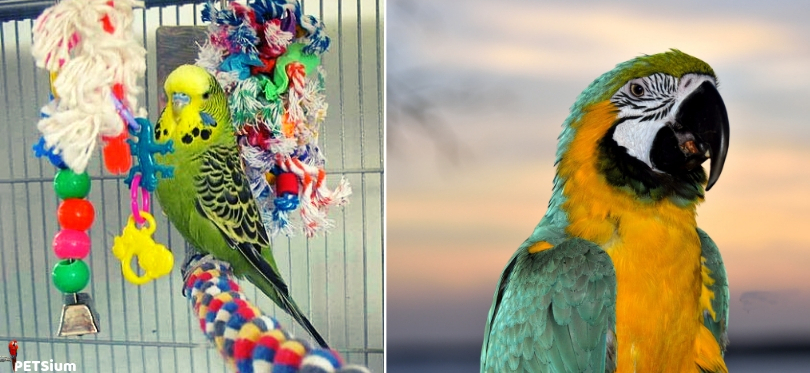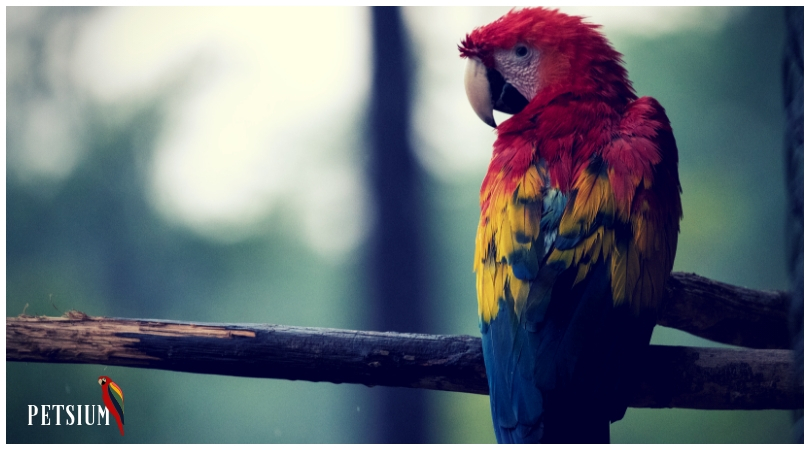Parrots and Pet Birds make wonderful companions that can form intense emotional attachments with you. Whether you are a long time owner of one already or just thinking of becoming one, you can be sure there will never be a dull moment with one of these little cuties around.
When we buy pet birds, we must accept the fact that their behaviour may not always be perfect by human-behaviour standards. We should, however, commit ourselves to taking the best care possible of our birds for the rest of their lives.
That is no small commitment. To fulfill this obligation, we need to provide any birds we buy with the largest appropriate parrot cages we could afford, the most nutritious parrot food, and we need to keep their environments as clean as possible. Further complicating matters, many bird species live long lives, and some birds may easily outlive their owners.

If you are looking to purchase a parrot or pet bird, be sure to check out all of the different parrot species and bird species available to you and discover their good points and bad points. You also should check out appropriate parrot cages, parrot food and parrot toys to ensure a safe and happy environment for your pet parrot or bird.
Training a parrot is very rewarding and if you are so lucky to choose a parrot or pet bird that is capable of talking, then it just gets even more fun!
Parrot and pet bird owners must provide the best of bird care in order to avoid bird illnesses and diseases and investigate parrot supplies to purchase the best products you can afford for your parrots.
Buying Your First Pet Parrot
Buying a parrot, especially a first parrot, is a big decision and not to be taken lightly. Parrots require time, commitment, care, love, and will live for many years if cared for properly. Before buying a parrot, you must consider several important factors. This is the only way that you will be happy with your decision long after your purchase. This is also the only way to ensure the parrot will not end up having to be re-homed.
First, consider the amount of space you have available. Your parrot will require a spacious cage to call its own home. It should also have a play stand or play area.
Small or Large Parrots: Who Should Own One?
When thinking about pet parrots there are so many choices one can make. Just walk into a pet store and you will see a very wide variety of pet parrots to choose from. The question you need to ask yourself is: Which pet parrots are the best for me? Should I choose a small parrot or a large parrot?
Firstly, I’ve would like to mention that whether you decide to own a small parrot or a large parrot they will both require a good amount of attention given to them. Generally the rule of thumb is: The bigger the pet parrot is, the more attention that pet parrot will need.
This doesn’t include the Goffin Cockatoo though. He is a much smaller parrot than the rest of his cockatoo family, but like all cockatoos even this small parrot will require lots and lots of attention. A Cockatiel, on the other hand requires about as much attention as a pet budgie.
I am not talking about run of the mill budgie that can be picked up at the local pet shop for a dime a dozen. Many of these small parrots are bred only for the money and not much care has gone into familiarizing them with people to be sociable.
Here again though, I don’t want you to think that these small parrots cannot make good pets. They too need attention and the more attention you spend with your pet parrots, the tamer and more sociable they will become.

When choosing a small parrot the first thing you should make sure of is that the small parrot is hand-fed. Many breeders will take the time to hand feed their fledgelings until they are able to eat on their own. By hand feeding these small parrots, they get used to being held and have very little fear of human hands or faces.
They will willingly come up on your hand and spend some time chatting away with you and playing silly games.
Small parrots should be chosen if you meet the following criteria:
You are young -under the age of 21. Small parrots are best for this age group as they are easily handled and if the young person gets bored with them then it is not such a hassle to either take care of the parrot yourself or find a good home for it.
You are older – over 50. Remember that large parrots can live a very long time and may become heartbroken if you were to pass on before they do. Small parrots have much shorter life spans and so the chances of you being well enough and able to care for him is greater.
Which small parrots would be the best choices for you?
- If you want a talking parrot that is small then I would suggest that you choose a male, hand-fed budgie from a reputable breeder or pet store.
- If you don’t care if your small parrot talks then love birds are cute little birds. They can be a little devilish at times though. They tend to try and escape every time they get a chance.
- Cockatiels are lovely little birds and the males can generally learn to talk a little. Their speech is more like a whistle but it is identifiable.
Remember:
- No pet parrots are guaranteed to talk, whether they are small parrots or large parrots.
- You will be much happier and it will be easier to teach your small parrot to talk if you find yourself a male bird rather than a female.
- It is much easier to keep a hand-fed bird tame than it is to tame a non hand-fed small parrot.
- A large parrot may not be advisable depending on your age bracket.
Do you have the space to provide these important factors for your parrot?
Think about this critically because, if you were to buy a African Grey parrot, you need LOTS of space. However, a Budgie or Cockatiel doesn’t require nearly as much room. Sure, the big, beautiful birds are great, but can you live with a huge cage and enormous play stand in your home? This will help you choose the right size parrot to consider.

Also, you must consider the other humans and animals in the home
Children and large parrots don’t mix very well and every parrot deserves out-of-cage play time every single day. Big parrots can break small fingers; after all they crack walnuts and Brazil nuts in the wild. All parrots make noise to some degree or another and some can be quite loud. How will your spouse or roommate feel about the noise? Parrots are messy; how will the family feel about this factor?
If you have dogs, cats, snakes, ferrets, or other pets, your parrot could become a meal for the other animal. It isn’t fair to confine a parrot to its cage all the time because you have lots of other pets and it isn’t safe for the bird to be outside the cage.
Can you afford the cost of the parrot you want as well as the cage, toys, food, and medical care?
Big birds require big cages which are costly. It is not unusual to spend $1,000 for a macaw cage! Again, smaller parrots require smaller cages which cost much less. Every parrot must have a yearly medical checkup and any emergency medical care required in the event of an injury or illness. Can you afford the vet bills?
Toys and food are really only a consideration if you are thinking of buying a large parrot. Big parrot toys can be expensive and they destroy them as part of their healthy chewing and play. Big parrots also eat a lot more food than smaller parrots.

Do you have the time for a parrot to live happily with you?
A parrot wakes up about the time the sun arrives and goes to be when it gets dark. For many career-oriented adults, these are the same hours that they are away from home working. It isn’t enough to spend Saturday and Sunday with your parrot.
You need to be able to spend quality time every single day with a parrot for its emotional health. The bird should be out of the cage as much as possible. If you can not provide time for a parrot, you should not consider buying a parrot.
Fifth, do you have the time and motivation to clean and care for the parrot?
A parrot has to have fresh food and water daily and needs the debris cleaned from the cage daily. Every week, as a minimum, the cage needs a thorough cleaning. Play stands and play areas also require cleaning. Molted feathers will have to be cleaned up, as will seed husk or dropped pellets, food that is slung or dropped and toys that are dropped over the side of the play area. Can you provide this mandatory service? If not, you shouldn’t buy a parrot.
Now, the good news is that if you have a stable lifestyle that allows you to provide for a parrot, giving quality time every day, maintain a regular schedule, and everyone in the household wants the parrot, then and only then should you consider buying a parrot!